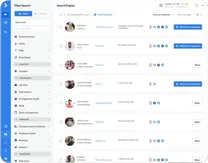
Do you know that around 16% of U.S. property owners don’t actually live on their properties? These absentee owners often find it challenging to manage their properties, especially when listings expire.
Normally, tracking down these leads requires extensive manual data collection from MLS (Multiple Listing Service) and county records, not to mention dealing with outdated contact information.
What if there was a way to streamline this process, making sure you’re the first to contact these owners with only active cell phone numbers? This guide simplifies the task for you.
We’ll show you the most effective strategies to swiftly and efficiently find absentee owner leads, reducing your workload and boosting your success in the competitive real estate market.
What are Absentee Owner Leads?
Absentee owner leads are contact information for property owners who do not reside in the properties they own. These leads are particularly valuable for businesses targeting property investors or those seeking properties that aren’t actively on the market.
Owners who don’t live in their properties are often more inclined to sell, making these leads extremely useful for real estate professionals looking for off-market opportunities.
Typically, these leads include names, addresses, and contact information, which can be important for direct marketing campaigns or real estate professionals looking for off-market opportunities.
Across nine major city areas, the number of homes sold to absentee owners has doubled since 2020, rising from 18% to 36%. So, if you’re looking into real estate, this statistic suggests there’s a growing market for properties owned by absentee owners.
This could be a chance for you to explore investment opportunities or potential sales. It’s essential to understand this trend if you want to make informed decisions in the real estate market.
How to Get the Best Absentee Owner Leads
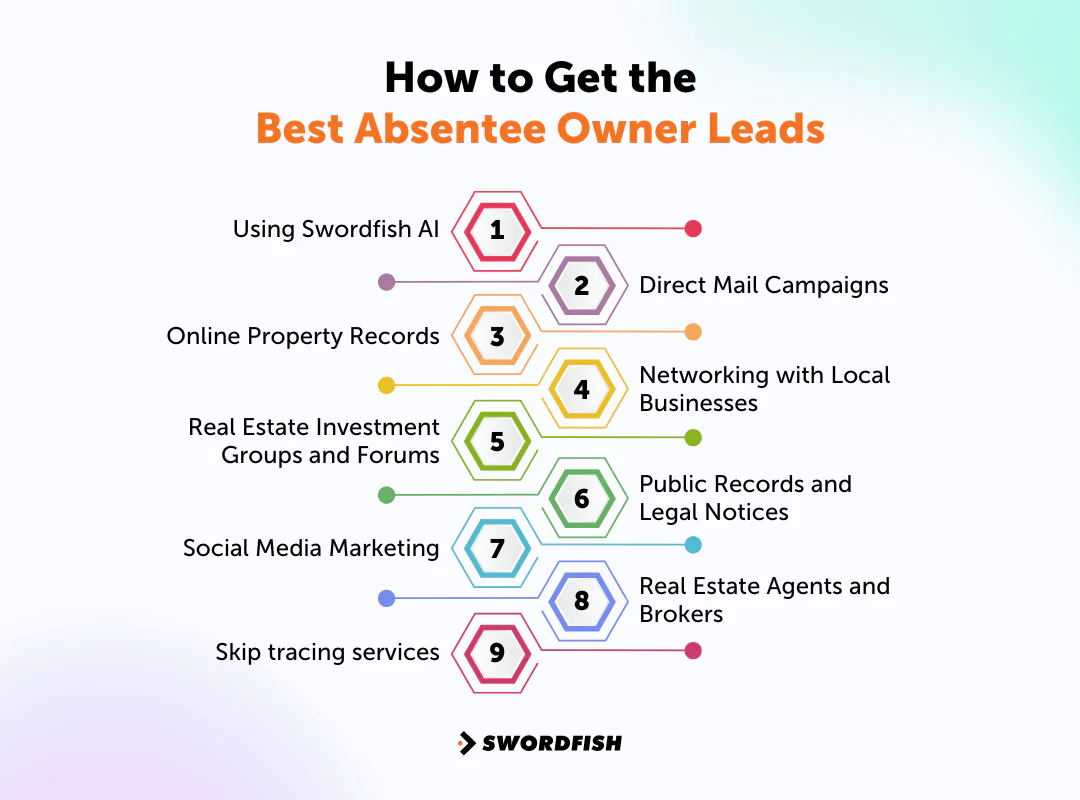
Looking for top-notch absentee owner leads?
Start by finding real estate databases and public records. Use targeted email marketing campaigns and direct mail to reach these homeowners. Networking with real estate agents and utilizing online platforms can also bring promising leads.
These are just the basic methods, there are many other effective strategies that will help you get the best absentee owner leads. Let’s see what they are:
1. Using Swordfish AI: Get the Best Absentee Owner Leads
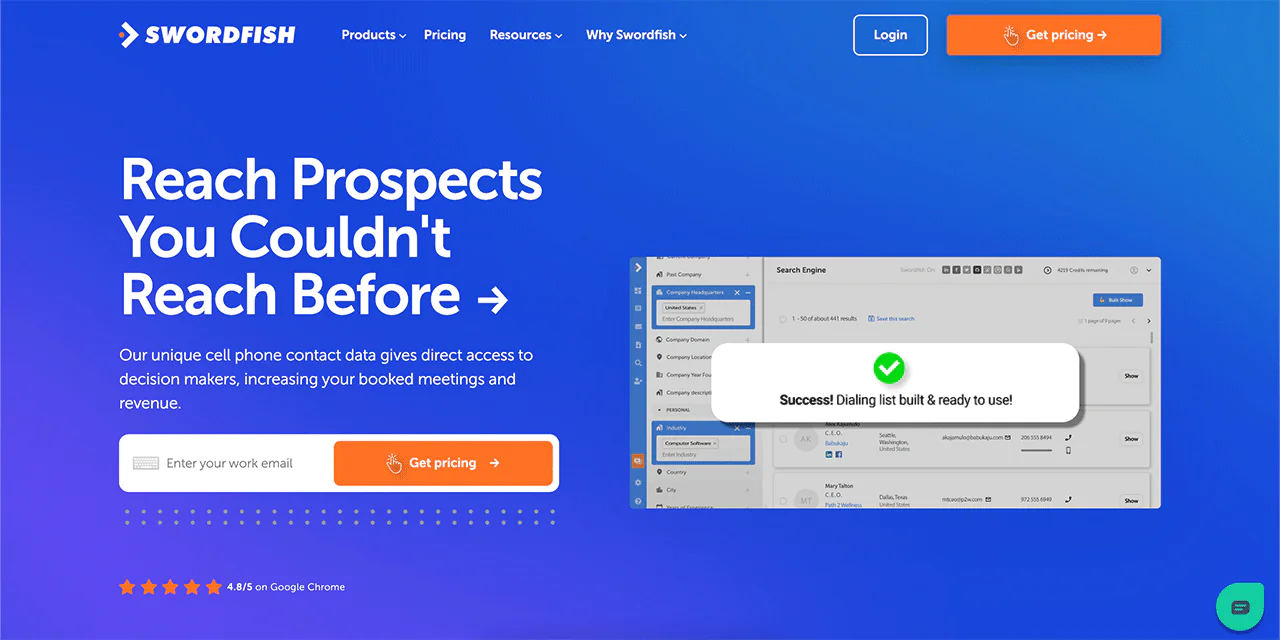
Swordfish AI is the top choice for sourcing absentee owner leads, with over 50,000 sales and recruitment experts utilizing it. This tool allows for personalized contact searches, including cell phone numbers and mailing addresses.
It enhances the accuracy of finding cell phone numbers by 33% and is 45% more precise than its competitors. Thus ensuring you receive dependable information through instant checks.
While having a vast database of 3.5 billion profiles, Swordfish AI simplifies the process of finding contacts. Additionally, we offer a Chrome extension, enabling you to swiftly gather data from LinkedIn, Facebook, and other sites, thereby enhancing your marketing strategies.
Our platform’s advanced search capabilities extend beyond simple filters like location and property type. You can generate your leads search based on potential equity, historical property data, and even seasonal trends, providing you with tailor-made precision.
Swordfish AI further enhances your outreach efforts with automated campaign tools, complete with templates and tracking features to help you effectively nurture leads.
Armed with these powerful features, Swordfish AI enables you to connect with top-quality leads more effectively, greatly improving your real estate investment success.
Key Features of Swordfish AI
Here are the key features of Swordfish AI:
Prospector
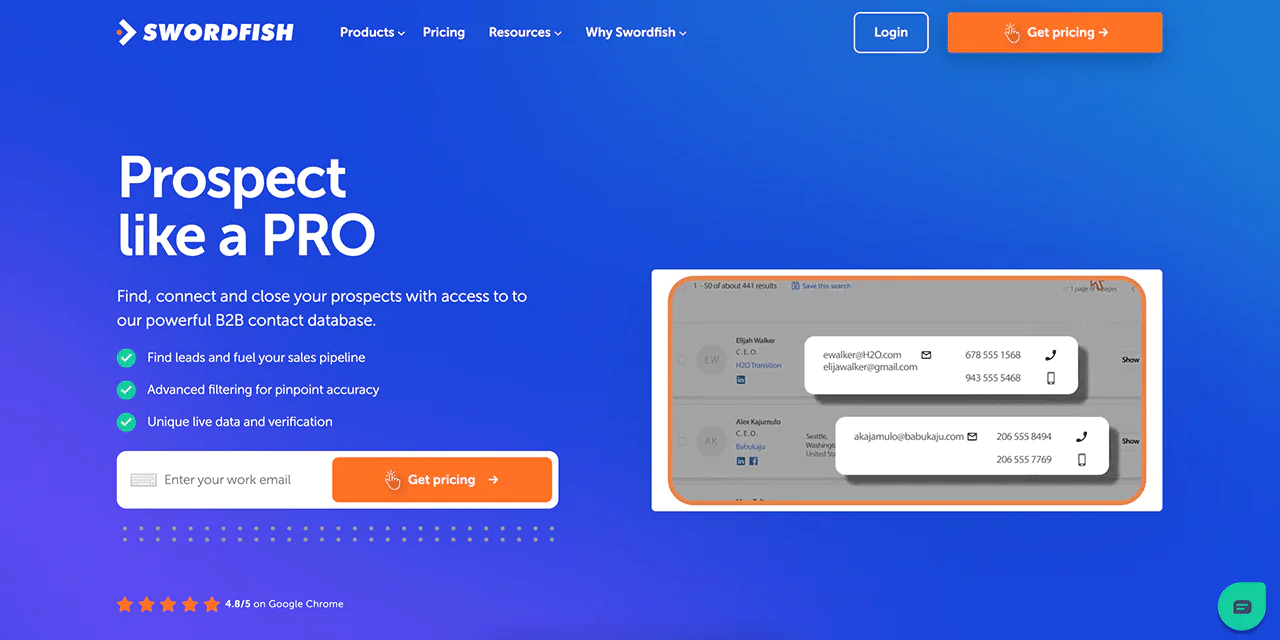
Use the Prospector to directly search and identify absentee owner leads in Swordfish AI’s database. Simply enter specific criteria like location and property type to find potential investment opportunities quickly.
Chrome Extension
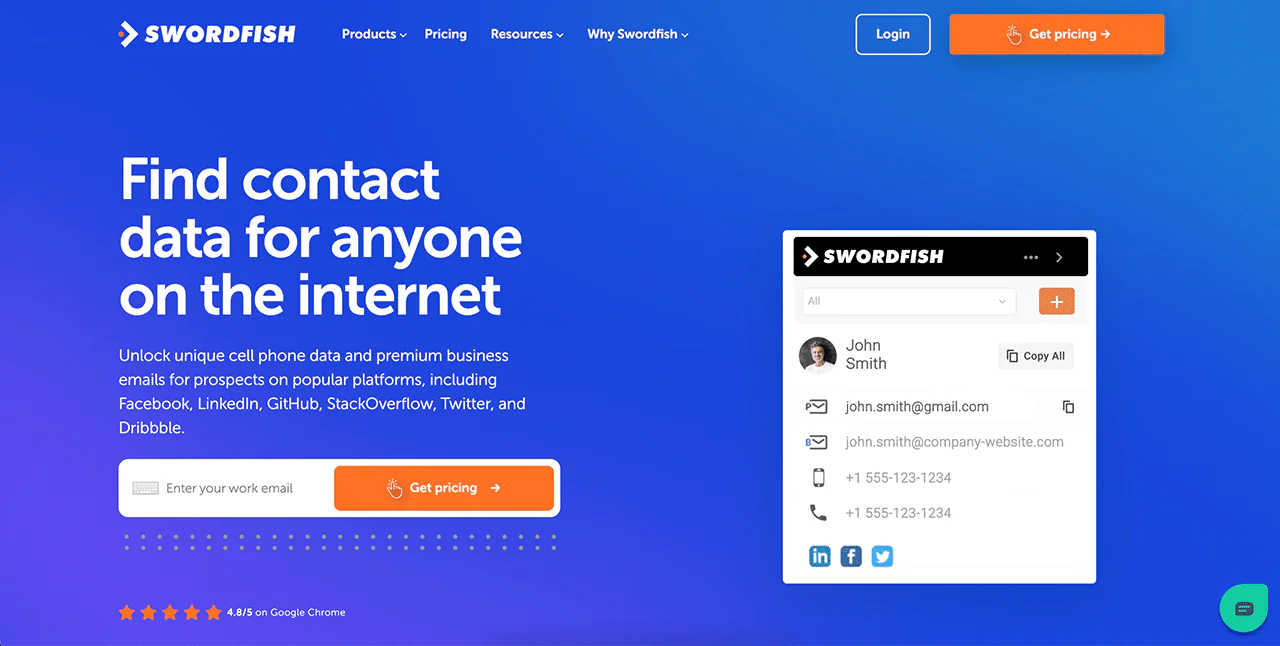
Install Swordfish AI’s Chrome Extension to seamlessly gather contact information on absentee owners while you browse online property listings or social platforms. This tool integrates with your browser for easy access.
Bombora Intent Data
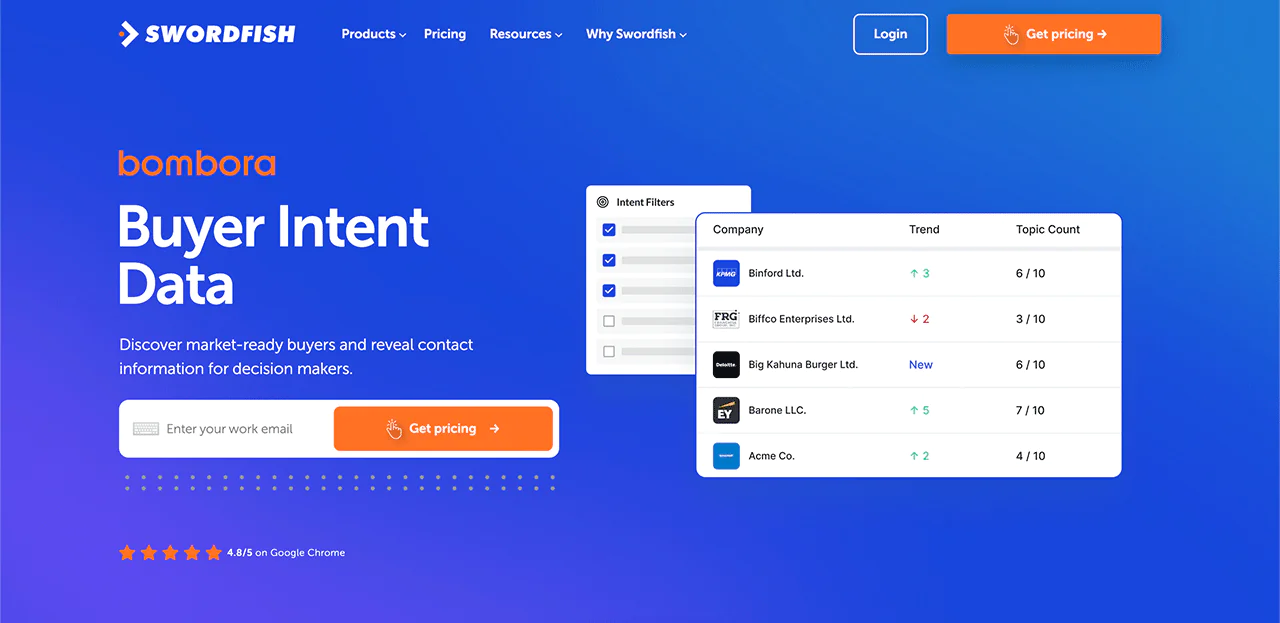
Use Bombora® Intent Data within Swordfish AI to identify absentee owners who are actively looking to sell or manage their properties. This insight helps you approach leads who are most likely ready to engage.
Reverse Search
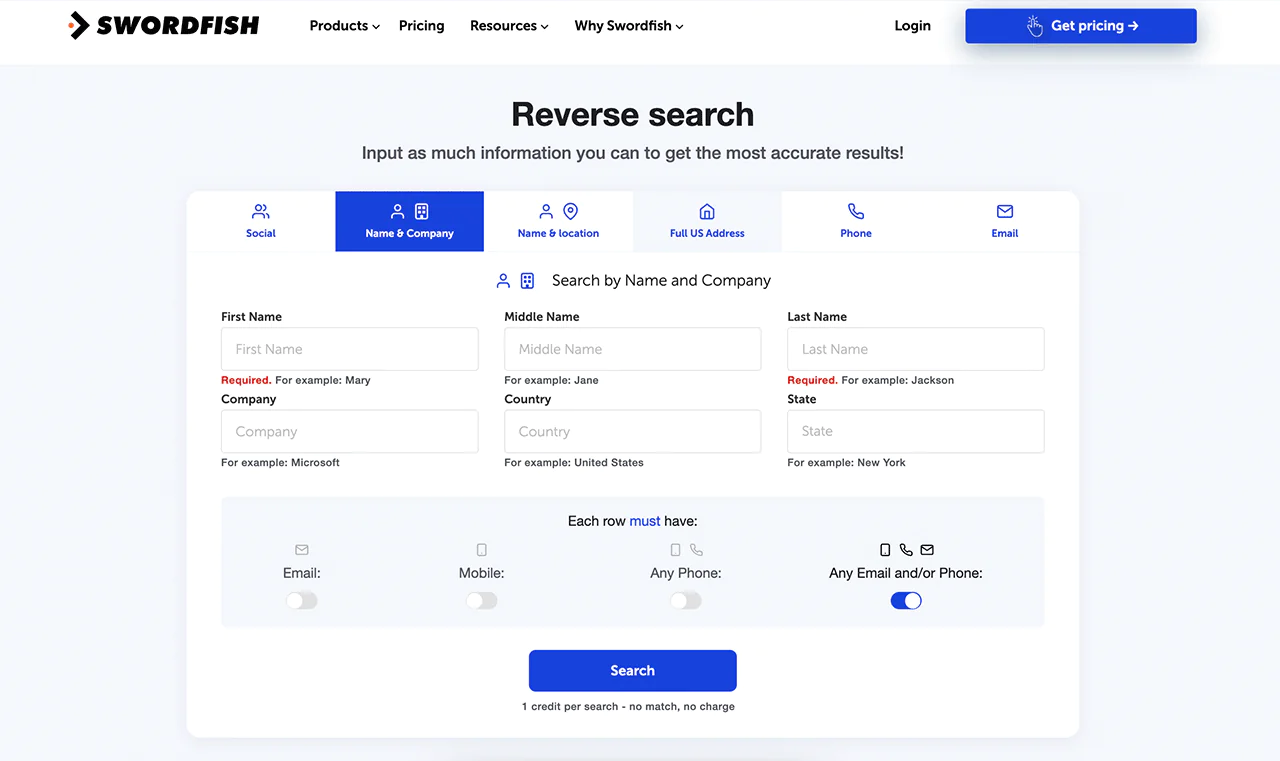
With the Reverse Search feature, you can input social media ID or phone and email to discover property ownership details. It’s ideal for when you have contact info and need to connect it to properties.
File Upload
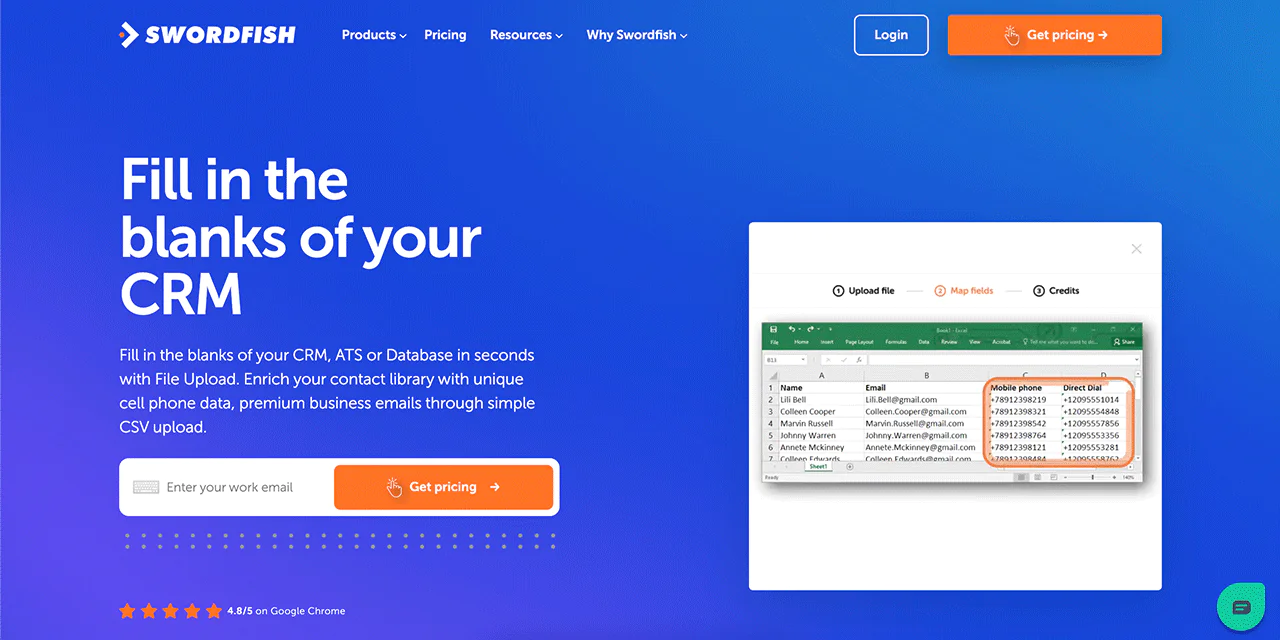
Bulk upload a list of contacts through the File Upload option. Swordfish AI processes these files to match names and contact information with their database of property owners, providing you with leads in bulk.
API Integration
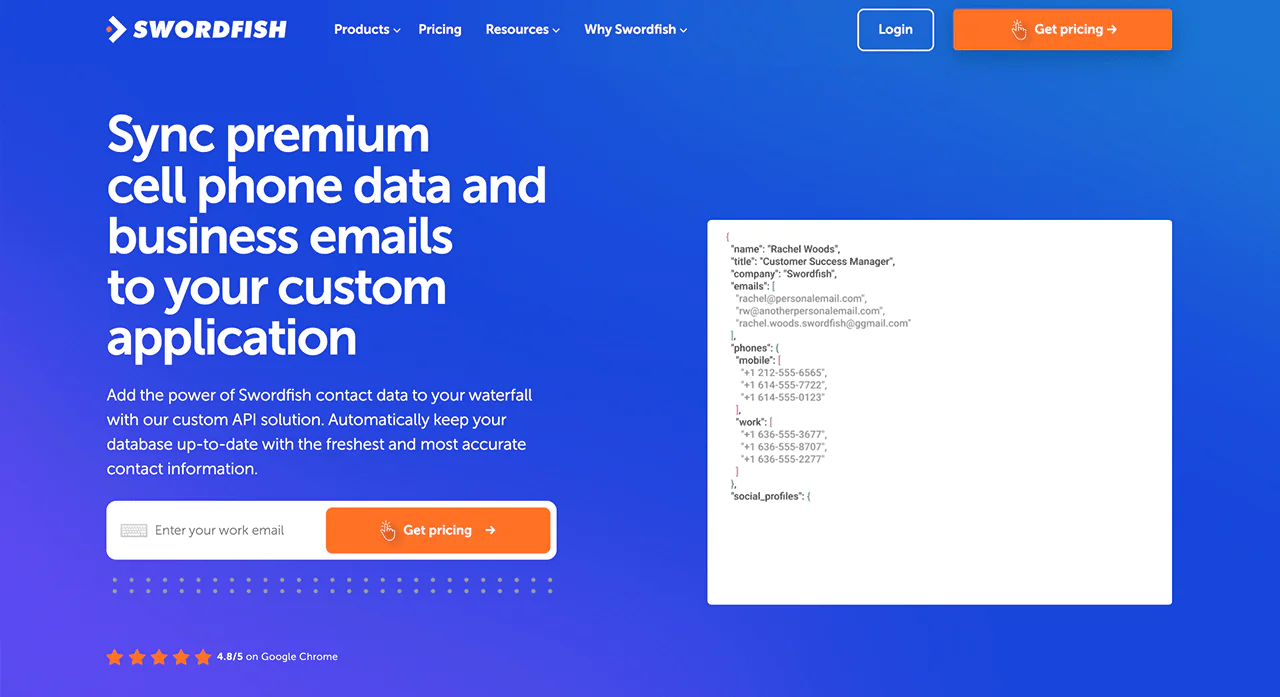
Integrate Swordfish AI with your existing CRM or other software systems using their API. This allows you to automate the lead generation process and maintain a flow of absentee owner information directly into your systems.
2. Direct Mail Campaigns
Direct mail campaigns are a powerful method for reaching absentee owners, especially in real estate. By targeting properties that appear unoccupied or are known as rental properties, you can personalize your message directly to the needs of absentee owners.
Writing letters or postcards that focus on things you care about, like taking care of your property, staying safe, or understanding changes in the local market, can really grab your customer’s attention.
For instance, offering a free property analysis or a consultation about local real estate conditions can provide immediate value to these owners.
The Data & Marketing Association reports that direct mail has higher response rates than digital channels, with 5.3% for house lists and 2.9% for prospect lists. This suggests a strong potential for engagement when your message directly addresses the recipient’s needs.
Ensure that your contact details are prominently displayed, making it easy for owners to reach out to you, thus increasing the likelihood of initiating meaningful conversations and potential deals.
3. Online Property Records
Online property records are an important resource for identifying absentee owners in the real estate sector. These records, available through most county or city websites, allow you to access detailed information about property ownership.
When these addresses differ, it often indicates an absentee owner, who may be more motivated to sell or need property management services. Accessing these records might require a fee, but the investment can be worthwhile as it opens up avenues to high-quality leads.
For example, once you identify a property with absentee ownership, you can use the information to customize your communication effectively.
Sending personalized direct mail or making targeted phone calls can engage these owners directly. Addressing their specific needs or offering your services increases the likelihood of a favorable response and potential business opportunities.
4. Networking with Local Businesses
Networking with local businesses should be a key focus if you’re looking to find absentee owner leads in real estate within your area. Building partnerships with entities like property management firms, landscaping companies, and local utility providers can be a rich source of referrals.
These businesses often serve many absentee owners who don’t live locally but still need regular services for their properties. For instance, a landscaper who knows the challenges faced by an absentee owner might suggest your property management services as a helpful solution.
Getting involved in community business events, local trade shows, and joining business associations can further strengthen your network. These connections not only provide direct access to potential leads but also lend credibility to your services through referrals from trusted local service providers.
This strategy is highly effective because it leverages existing community relationships to grow your client base.
5. Real Estate Investment Groups and Forums
Joining local real estate investing groups and engaging in online forums are powerful ways to find absentee owner leads. These platforms create a community where investors can exchange important information, insights, and resources about property investments.
By participating in these groups, you gain access to a wealth of knowledge and can share leads with other investors whose current information does not align with their investment goals.
For instance, if you focus on residential properties and another investor concentrates on commercial properties, you can swap leads that better fit each other’s specialties.
This method not only broadens your network and potential deal flow but also helps you build relationships with trusted peers. Such networking can open doors to partnerships and joint ventures that might not have been feasible otherwise, greatly enhancing your prospects in the real estate market.
6. Public Records and Legal Notices
Public records and legal notices are invaluable resources for identifying absentee owners who may be motivated to sell their properties.
These records, detailing properties in probate, foreclosure, or with tax liens, are accessible via local government websites or at physical courthouses.
Properties involved in these situations often indicate landlords who might be facing challenges in managing their property due to financial distress or inheritance issues.
For instance, a property in probate may belong to an owner who has passed away, and the heirs could be willing to sell the property quickly to settle the estate.
Similarly, properties facing foreclosure or with tax liens suggest financial trouble, making owners more likely to sell at a reduced price to quickly resolve their issues.
By targeting these specific situations, you can approach owners who have a higher likelihood of selling, often with less competition and potentially better purchase terms.
7. Social Media Marketing
Social media marketing, particularly through platforms like Facebook and LinkedIn, is an effective strategy for targeting absentee property owners.
This approach is supported by data from the National Association of Realtors, which indicates that 63% of realtors utilize social media primarily to post property listings.
These platforms offer advanced ad targeting options that enable realtors to specifically target individuals. Targeting is based on demographics, geographical locations, and behaviors aligned with property investors or those owning multiple properties.
For example, you can target users who own properties in your area but reside elsewhere, suggesting they are absentee homeowners. Using this detailed data allows you to craft ads that directly appeal to potential clients’ interests in property management, buying, or selling.
This focused marketing effort is not only efficient but also cost-effective, enhancing engagement potential, improving conversion rates, and optimizing your advertising expenditure.
8. Real Estate Agents and Brokers
Collaborating with real estate agents and brokers is a strategic approach to access high-quality leads on absentee owners. These professionals are deeply embedded in the local market and often possess insights into motivated sellers not readily visible to the public.
By partnering with them, you can tap into a reservoir of pre-qualified leads, streamlining the process of finding potential absentee owners looking to sell.
For instance, establishing a referral agreement where you offer a fee for any leads that convert into sales can incentivize agents and brokers to share their exclusive information.
This partnership not only broadens your access to potential deals but also leverages the agents’ expertise and networks, enhancing your ability to close transactions efficiently.
9. Skip Tracing Services
Skip tracing services are key tools for real estate professionals like you who know the addresses of properties but need the owners’ contact details.
These services use a mix of public and private databases to find phone numbers, email addresses on Facebook or other platforms, and other important information. This is especially important when you can’t find what you need through usual methods.
Once you get the owner’s contact information through skip tracing, you can send them a personalized email or give them a call. This direct way of communicating lets you focus on exactly what the owner might need or want, potentially speeding up negotiations and making the whole transaction process smoother.
In essence, skip tracing closes the gap between finding potential absentee owner properties and actually getting in touch with the owner.
Who Needs Absentee Owner Leads?
Absentee owner leads are valuable for several groups of people, often for business or investment purposes. Here’s a breakdown of who might need these leads:
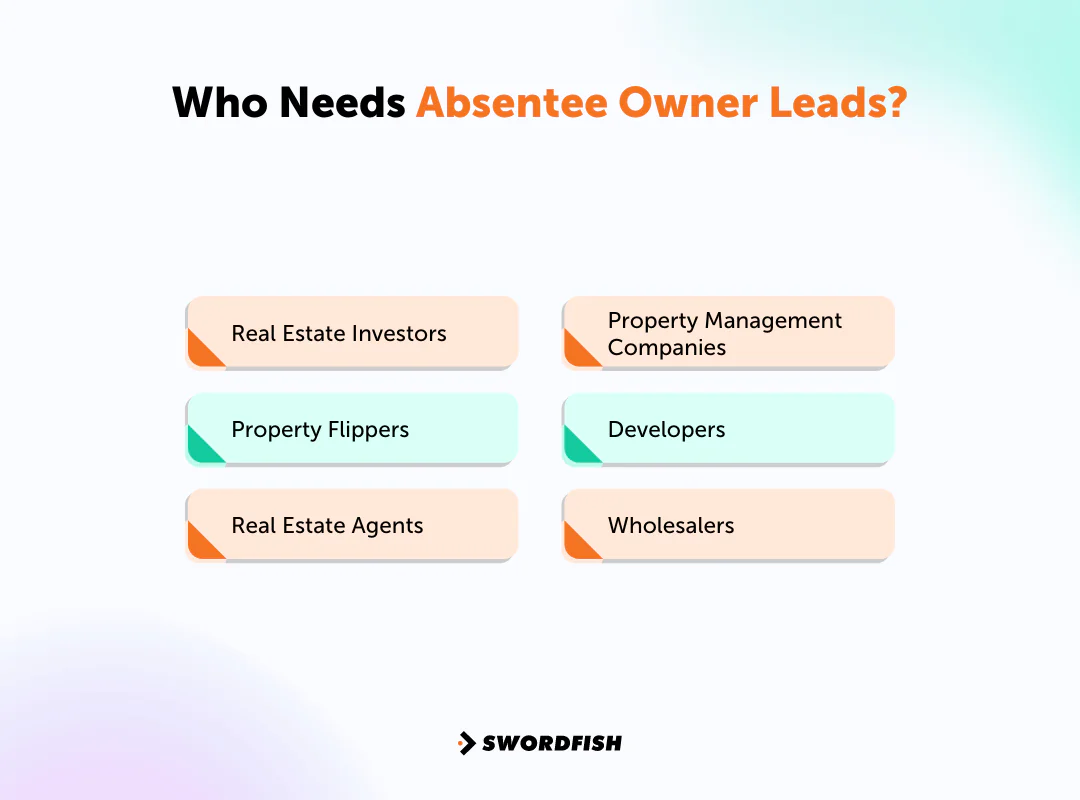
- Real Estate Investors: Real estate investors use absentee owner leads to find neglected properties, buy at lower costs, and profit through renovations and resale.
- Property Flippers: These are investors who buy properties, renovate them, and sell them for a profit. Absentee-owned properties might be ideal targets due to potential neglect or disrepair.
- Real Estate Agents: Agents seek absentee owner leads to find potential lead lists or clients who might want to sell their properties.
- Property Management Companies: These companies might offer services to absentee owners who need someone local to manage their property.
- Developers: Developers look for properties in desirable locations. Absentee owners might be more willing to sell land or properties that are underutilized.
- Wholesalers: Real estate wholesalers find properties under market value, get them under contract, and sell the contract to another buyer. Absentee owners can be a good source for such deals.
How Much Do Absentee Owner Leads Cost?
When you’re looking into absentee owner leads, the cost can vary widely based on the source and quality of the data. Here’s a breakdown to help you understand how much you might expect to pay:
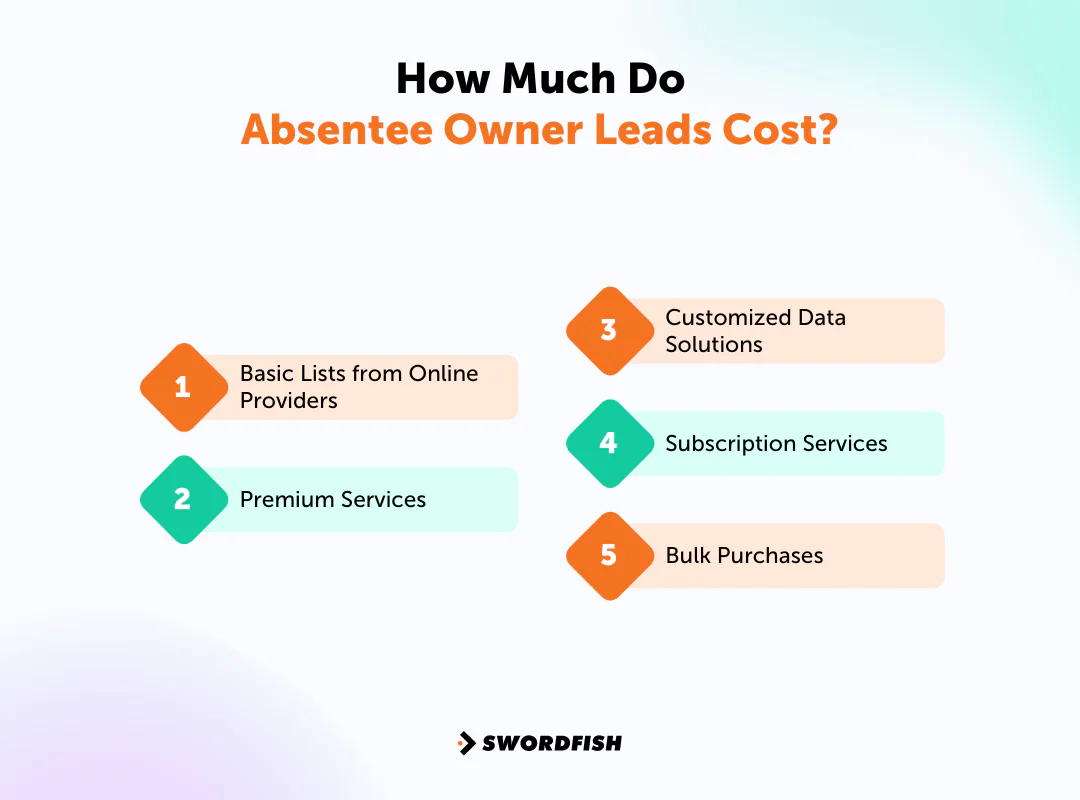
Basic Lists from Online Providers
A basic list of absentee owners can start as low as $0.20 per lead. These lists typically provide basic contact information but may not include detailed property data or owner motivation.
Premium Services
More comprehensive services can charge anywhere from $0.40 to $1.00 per lead. These leads often come with added information like the estimated property value, potential equity, and whether the property is distressed, which can be very valuable for your investment strategy.
Customized Data Solutions
If you need highly specific information, such as leads filtered by geographic location, property type, or owner status (like out-of-state owners), prices can go higher. Customized data solutions might cost upwards of $1.00 per lead depending on the depth of data and exclusivity.
Subscription Services
Some platforms offer monthly subscriptions where you can access a database of leads. These subscriptions can range from $50 to over $200 per month, depending on the richness of the data and the tools provided.
Bulk Purchases
Buying leads in bulk can often reduce the cost per lead. Some providers offer packages where you can buy thousands of leads at a time. Thus potentially lowering the cost to under $0.20 per lead, especially if you commit to long-term purchases.
Conclusion
Finding the best absentee owner leads is important yet challenging due to the need for accurate and updated information. The struggle often lies in filtering through outdated contacts and manually correlating data from various sources.
This is where Swordfish AI excels. We provide top-tier absentee owner leads by ensuring you have access to the most current and actionable data.
Try Swordfish AI today, and experience the difference in efficiency and success in locating and connecting with absentee property owners.
Frequently Asked Question
How often should I follow up with absentee owner leads?
Follow-up frequency should be based on their initial response but generally, a follow-up every few weeks is reasonable. If they express direct interest, you might follow up more frequently based on their cues.
Are absentee owner lists free?
No, absentee owner lists are typically not free. They usually require a subscription to a data service or purchase from a list provider that compiles such information for real estate marketing purposes.
Why target absentee owners for real estate leads?
Targeting absentee owners for the leads for real estate can be effective because they may be more motivated to sell. This motivation often arises if they are managing the property from a distance, dealing with tenant issues, or facing financial pressures.
What information is included in the absentee owner leads for sale?
Absentee owner leads for sale typically include details like property addresses, owner contact information, property values, and the status of the property (rented, vacant, etc.). They may also provide insights into the owner’s motivation for selling.
Are there specific legal considerations to be aware of when dealing with absentee owners in real estate?
When dealing with absentee-owned real estate, ensure compliance with local laws, verify ownership, and check for liens to avoid legal issues and ensure lawful transactions. Following these guidelines will help protect both your interests and those of the property owner.


 View Products
View Products


